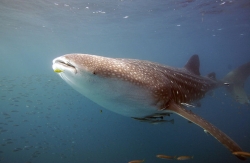Wave Foundation Supports SRI’s Operation Whale Shark

New York, NY, January 23, 2008 --(PR.com)-- Wave Foundation of Kentucky’s Newport Aquarium has awarded $6,200 to Operation Whale Shark, a study conducted by the Shark Research Institute (SRI). The Wave grant, together with funds from the World Wildlife Fund, is helping SRI scientists identify the size, structure, and habits of the population of whale sharks that aggregate in Tanzanian waters. As SRI scientists learn where whale sharks travel they are able to concentrate conservation efforts in areas where these ocean giants are at greatest risk.
Funds provided by the Wave Foundation and World Wildlife Fund-Tanzania allowed researchers in this multi-year study to place placard identification tags on dozens of whale sharks off the coast of Tanzania, and eight of the sharks have been outfitted with satellite tags. Known as PAT tags, the tags archive locational and depth data, then detach from the host animals on pre-programmed dates and transmit their archived data to the Argos satellites, a system of orbiting polar satellites. The Argos satellites, in turn, forward data from the tag to scientists at SRI.
Satellite technology allows scientists to peer into the amazing day-to-day lives of these ocean giants. For example, whale sharks have the coloration of surface dwelling fish, but SRI’s satellite tags revealed the sharks dive to depths of more than 2,500 feet (762 m) often several times each day, with some individuals diving to depths of 3936 feet (1,200 m), possibly deeper. But what the sharks do in the ocean depths remains a mystery.
SRI’s Operation Whale Shark, initiated in 1993, is the oldest and largest whale shark study in the world. SRI field researchers have placed ID tags on hundreds of the “gentle giants” and photographs of many of the sharks are logged in the Ecocean database, a photo-catalogue which uses the unique pattern of spots and stripes of individual animals as identifiers. In addition, SRI has utilized satellite telemetry to monitor the travels of whale sharks in the Caribbean Sea, and the Atlantic, Pacific and Indian Oceans.
“SRI now has almost the entire Mafia Island population of whale sharks identified and marked,” says SRI marine biologist Matt Potenski. “This research is enabling development of sustainable tourism and giving living whale sharks sufficient value to render their harvest uneconomical and undesirable. Local stewardship and legal protection has created a refuge for whale sharks.”
Visitors to the Newport Aquarium donated funds to the Aquarium’s “Dollars for Conservation Campaign”, which is administered by the Wave Foundation. "SRI, the Wave Foundation and WWF-Tanzania are on the frontline of all facets of whale shark management in the Mafia Island area and are aiding in the promotion of the whale shark as a living resource in this developing area,” adds Potenski.
Operation Whale Shark receives no government funding and relies on such continued public, private, and corporate support in order to continue its research and conservation efforts in Tanzania and other locations across the world.
For more information, visit www.sharks.org
###
Funds provided by the Wave Foundation and World Wildlife Fund-Tanzania allowed researchers in this multi-year study to place placard identification tags on dozens of whale sharks off the coast of Tanzania, and eight of the sharks have been outfitted with satellite tags. Known as PAT tags, the tags archive locational and depth data, then detach from the host animals on pre-programmed dates and transmit their archived data to the Argos satellites, a system of orbiting polar satellites. The Argos satellites, in turn, forward data from the tag to scientists at SRI.
Satellite technology allows scientists to peer into the amazing day-to-day lives of these ocean giants. For example, whale sharks have the coloration of surface dwelling fish, but SRI’s satellite tags revealed the sharks dive to depths of more than 2,500 feet (762 m) often several times each day, with some individuals diving to depths of 3936 feet (1,200 m), possibly deeper. But what the sharks do in the ocean depths remains a mystery.
SRI’s Operation Whale Shark, initiated in 1993, is the oldest and largest whale shark study in the world. SRI field researchers have placed ID tags on hundreds of the “gentle giants” and photographs of many of the sharks are logged in the Ecocean database, a photo-catalogue which uses the unique pattern of spots and stripes of individual animals as identifiers. In addition, SRI has utilized satellite telemetry to monitor the travels of whale sharks in the Caribbean Sea, and the Atlantic, Pacific and Indian Oceans.
“SRI now has almost the entire Mafia Island population of whale sharks identified and marked,” says SRI marine biologist Matt Potenski. “This research is enabling development of sustainable tourism and giving living whale sharks sufficient value to render their harvest uneconomical and undesirable. Local stewardship and legal protection has created a refuge for whale sharks.”
Visitors to the Newport Aquarium donated funds to the Aquarium’s “Dollars for Conservation Campaign”, which is administered by the Wave Foundation. "SRI, the Wave Foundation and WWF-Tanzania are on the frontline of all facets of whale shark management in the Mafia Island area and are aiding in the promotion of the whale shark as a living resource in this developing area,” adds Potenski.
Operation Whale Shark receives no government funding and relies on such continued public, private, and corporate support in order to continue its research and conservation efforts in Tanzania and other locations across the world.
For more information, visit www.sharks.org
###
Contact
Shark Research Institute
Marie Levine
609.921.3522
www.sharks.org
Marie Levine
609.921.3522
www.sharks.org
Categories
